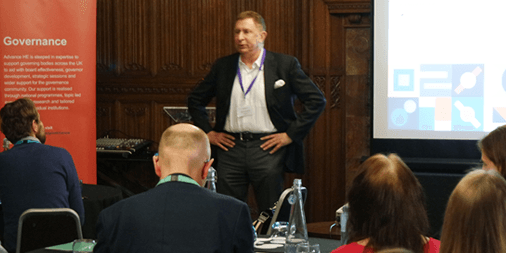Higher education governance is under the spotlight from the sector’s regulators and government. The future effectiveness of governance raises questions about the composition of governing bodies, how data is used to assist management and governors, and what should be a governing body’s focus? These questions were some of the topics discussed and examined at the recent annual Advance HE Clerks and Secretaries Network Event organised in partnership with AHUA.
Regulation and monitoring in England
Dr Camilla Briault, Strategic Business Manager, Competition and Registration team the the Office for Students (OfS) provided an update on the "regulatory framework, registration and ongoing provider engagement”.
The regulation and monitoring of higher education in England continues to evolve. Following the initial task of processing the high number of applications from providers seeking to become registered, the OfS is focusing on the ongoing monitoring of registered providers.
The aim is that the monitoring of registered providers should become increasingly proportionate, with OfS’s attention being focused on providers deemed to be at “higher risk” of breaching the ongoing conditions of registration.
All governing bodies of registered providers are expected to regularly assure themselves that the provider continues to meet the ongoing conditions of registration. This invites consideration of what is the best way for a governing body to ensure ongoing compliance with registration?
Composition of governing bodies
Alison Wheaton, Associate at Advance HE and PhD candidate in higher education governance at UCL Institute of Education presented new national research which has examined the structure and composition of governing bodies. Covering all types of provider, the research found that the average size of governing bodies was just under 19 members, with the number of external (lay) members typically being between 11 and 13.
For the sample of governing bodies covered by the research, 33 new Chairs were recorded over an 18-month period with 50% of these positions being filled by individuals from outside of the HE sector.
Nationally, few lay members of governing bodies were found to have experience of working in higher education. The governing bodies of some providers had no lay governors with that background. The research also suggested that relatively few governors had international experience, and generally the ethnic diversity of governing bodies was low even when including the composition of student governors. Considering what should be the level of diversity of a governing body, raises the question of what should be the relevant comparator population? For example, should the composition of the provider’s student intake act as the benchmark?
The emerging policy context in England raised questions as to whether in the future more governing bodies need to appoint individuals with a background in higher education as governors?
The data agenda
The session delivered by Alison Allden, Governor at Northumbria University, Trustee at Regents University and former CEO of HESA with Dr Adam Dawkins, Head of Governance and Assurance at the University of York, demonstrated how strategic data can and should help inform critical debate and decision-making in HE governing bodies.
Data continues to be increasingly important in the management and governance of higher education providers. New data sets were also emerging. An example was development and publication of the Longitudinal Education Outcomes (LEO) data, the UK Government's employment and earnings outcomes of higher education graduates broken down by subject studied and graduate characteristics including across different regional labour markets. Increasingly, more refined data was being released. Some providers discussed the LEO data with their governing bodies.
With the increasing availability of data, the importance of measuring what matters was emphasised. The governing body of an institution should be involved in understanding and challenging the KPIs used to support governance of strategy implementation.
Governance from higher education and beyond
Andrew Kakabadse, Professor of Governance and Leadership, Henley Business School and Emeritus Professor, Strategy, People and Leadership at Cranfield School of Management, related that the development of governance can be traced back to its very early historical roots. Recurring themes across history are the balance of attention between compliance and stewardship with the emphasis moving back and forward over time. Governing bodies today typically need to choose whether they focus their time and attention primarily on compliance or stewardship.
It was important for effective governance to ensure that a chief executive or vice chancellor did not become all-powerful and over-bearing. This needs the Chair of the governing body to act as a counter-balance. Some senior leaders encouraged the Chair in this aspect of the role, others did not.
Discussion about aspects of stewardship at a board meeting could be challenging. To allow constructive discussion and challenge, those engaged in the conversation need to share the same values for the organisation, ie they had common goals and aspirations.
The critical role of the Chair increasingly argued for the need to “professionalise” the role, including paying those individuals who undertook the role.

Governance is dynamic, and constantly evolving. Individual changes may appear incremental, but over time small changes typically build on each other, and become increasingly material.
The event raised a number of fundamental questions for governing bodies to consider, including:
- How do governing bodies assure themselves they are continuing to meet the ongoing conditions of registration?
- Does the governing body’s membership include independent members with a background in higher education? If not, is there a need to recruit such individuals?
- How does the governing body divide its time between matters of compliance and stewardship?
Advance HE members can download the presentation slides from the Clerks and Secretaries Event here.
View upcoming governance events
Find out more about the Governor Development Programme